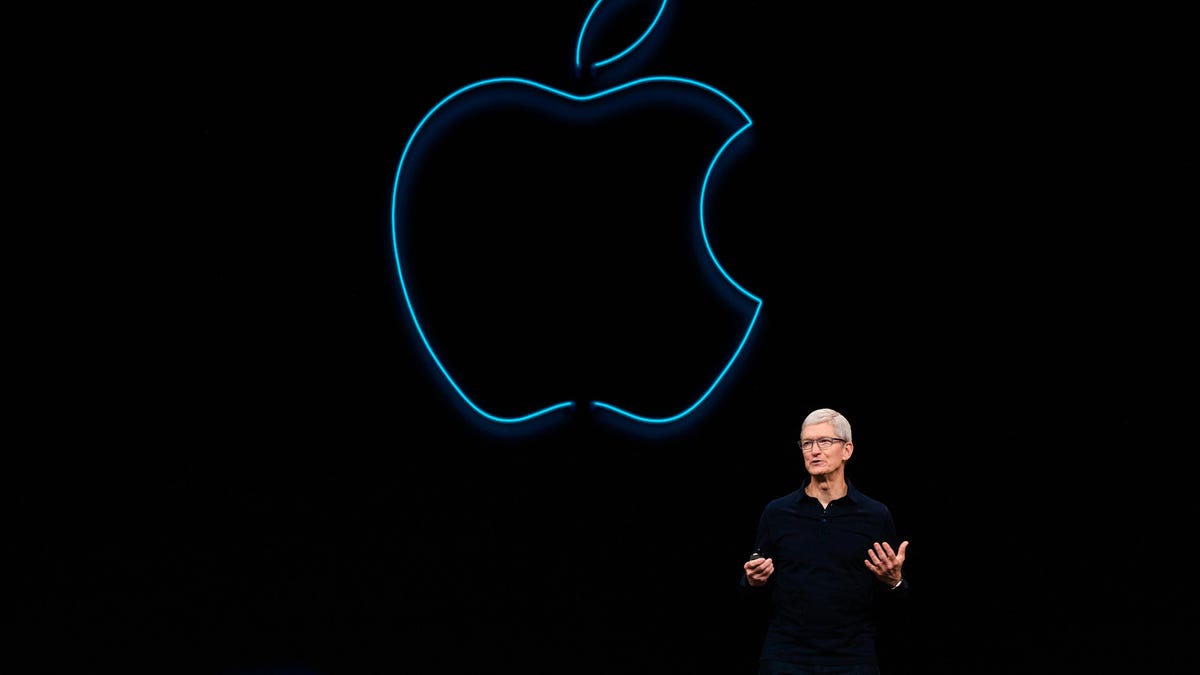Apple will open first India store next year, Tim Cook says at shareholder meeting
The company will also launch an online store there this year.

Apple is heading to India, CEO Tim Cook said at the company's annual shareholder meeting.
Apple is slated to open its first retail store in India next year, CEO Tim Cook said during the company's annual shareholder meeting in Cupertino, California, on Wednesday. The electronics giant will also open an online store in India this year, he added.
The process of opening a store in India has taken time because Apple has been seeking approval to operate in India without a local partner, Cook told shareholders. "I don't think we would be a very good partner of retail," he said. "We like to do things our way."
Cook called himself a "huge believer" in the opportunities India presented, saying the world's second biggest country by population was unparalleled in terms of vibrancy and demographics.
The shareholder meeting was held in the Steve Jobs Theater on Apple's spaceship campus. Apple didn't offer a video or audio stream, and reporters weren't allowed in the auditorium with shareholders and executives. Instead, they watched in a separate room via video. The meeting is an opportunity for owners of Apple stock to ask questions directly to the company's executives.
During the Q&A portion of the event, one shareholder asked whether Apple would consider using a larger venue for the meeting to accommodate more investors. Cook said the theater, named after the company's co-founder, was Apple's largest. "It would lose some of its specialness if it wasn't on the Apple site," Cook said of the meeting.
He was also asked why Apple didn't buy the rights to the Friends reunion, which will be on HBO Max in May. Cook said the show doesn't fit into Apple TV Plus's model.
"Apple TV Plus is about original programming," Cook said. "It doesn't feel right for Apple just to go out and take a rerun."
Cook said Apple has invested over $16 billion in research and development, the vast majority of it in the US. In addition, he said the company completed 14 acquisitions last year and opened seven new retail stores. Cook also cited Apple's commitment to boosting diversity and inclusion, noting that over half the people Apple hired in the US were from underrepresented groups.
Shareholders didn't ask about coronavirus, which has caused some bumps for the company. Apple said earlier this month that SARS-CoV-2, the name of the new strain, has hurt demand from Chinese customers, as well as production capabilities in the country. The electronics giant has said the impact of the disease means it will likely miss quarterly revenue guidance that it gave last month and could cause an iPhone supply shortage. In addition to being an important market for Apple, China is where the company assembles its phones .
Apple started temporarily closing its China stores in January when the virus began to spread outside of China to places like the US, Australia and Europe. It later reopened some stores with limited hours, but still struggled with a slowdown in shoppers. The tech giant also temporarily closed its corporate offices and contact centers in China.
"Our first priority is the health and safety of our employees and our partners and the communities that we're in," Cook said Wednesday.
One shareholder asked Cook to comment on complaints that Apple isn't cooperating in an investigation into a gunman who killed three people at a Florida Navy base in December. Cook said the company has been extremely cooperative.
"We have supplied all the information that we have on all requests that we've received," Cook said. "Don't think for a second that we have something that we're not giving."
It's not the first time Apple has faced this kind of challenge. In 2016, the company pushed back on the FBI's attempt to force the company to unlock an iPhone used by a terrorist.
"In essence, the question is: Should Apple have a backdoor or should the government have a backdoor into your iPhones, and we say 'No,'" Cook added. He was greeted with applause from the audience. "You can never have a backdoor just for the good guys. There's no such thing."
Another shareholder asked if Apple will pursue innovations based purely on a financial return on investment, or a "more altruistic perspective." Cook responded by saying Apple does many things that have no ROI.
"If you're a shareholder that believes that we should only do things with an ROI, then you're in the wrong stock," he said. "If things are good for the customer, then they'll be good for Apple over time. Maybe not in a quarter. But we don't run the company on a quarter-by-quarter basis."
Each of Apple's seven board members were re-elected during the meeting. Shareholders also approved the company's executive compensation plan and voted in favor of making Ernst & Young the company's accounting firm for 2020.
Shareholder proposals included asking Apple to make changes to shareholder proxy access, link executive compensation to sustainability metrics and support freedom of expression. Shareholders presenting the last proposal noted that Apple has removed VPN apps from China's App Store, but these VPNs are vital for groups like Tibetans and Uyghurs to stay safe online. All three proposals were rejected.
CNET's Shara Tibken contributed to this report.
First published Feb. 26 at 10:29 p.m. PT.
Update, 10:58 p.m.: Adds additional details from the meeting; 11:14 p.m.: Adds Cook's comments on gunman investigation. 11:27 p.m.: Adds Cook's comment on ROI.

